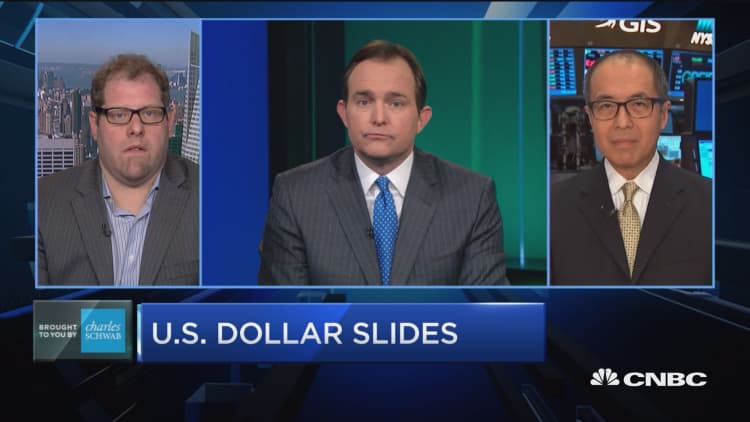
The U.S. dollar fell this week against a basket of currencies, weakening to its lowest level since mid-November on Thursday. But despite this near-term weakness, some strategists say the longer-term trend is a bullish one.
Mounting tensions between President Donald Trump and some foreign countries has driven the dollar lower, along with investors' uncertainty about just how hawkish the Federal Reserve will be this year. Win Thin, global head of emerging market currency strategy at Brown Brothers Harriman, said he is bullish on the dollar, anticipating that the Fed will raise its federal funds rate target multiple times this year.
"The markets right now are still a little skeptical of the Fed's tightening intentions. We saw that reaction after the [Federal Open Market Committee policy statement] yesterday. But this is a correction within, I believe, a dollar bull move that's still alive and kicking," Thin said Thursday on CNBC's "Power Lunch."
Broadly, he is bullish on the U.S. economy even though Trump hasn't offered much detail about stimulus. Higher interest rates generally boost the U.S. dollar's value relative to foreign currencies.
"Our view is that the driver, really, right now, is still U.S. interest rates. We're very bullish on the U.S. dollar. There's stimulus in the pipeline. Inflation is going up. We take the Fed at their word: They're going to hike three times at least this year, maybe even more. That's simply bullish for the dollar."
The dollar rose nearly 4 percent after the election as investors anticipated stronger economic growth under Trump. The president himself has decried a strong U.S. dollar. Max Wolff, market strategist at 55 Capital, said Thursday that what he sees as a shifting global political environment gives him pause about the dollar.
"Looks to us like the world is moving in a sort of protectionist and nationalist direction. And in that environment, it's not good to have a strong currency. People don't want to have a strong currency. And even if they do, they might not get it," Wolff said.
In a note Thursday, Bank of America Merrill Lynch Global Research's Athanasios Vamvakidis and David Hauner recommended that in hedging "Trump trades," investors should look to be long the U.S. dollar against the Australian and Canadian dollars.
"The so-called Trump trades, and particularly the USD, have seen a correction this year, as President Trump's rhetoric has shifted toward trade protection. Our baseline assumes the US will avoid such policies, but we also see risks and markets could get more concerned in any case," they wrote in the report called "Playing with fire: the FX implications of US trade protection."





